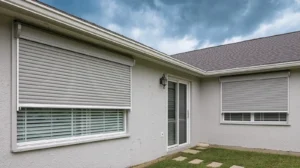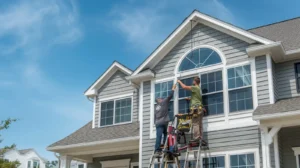Understanding Window Screens and Sun Control
Windows bring light and warmth into a home, but too much sunlight can cause problems. Bright glare makes it hard to watch TV or work on a computer. Heat from the sun can raise energy bills and make rooms uncomfortable. Over time, strong sunlight can also fade furniture, carpets, and flooring. Homeowners often ask, do solar screens work to fix these problems? Solar screens are designed to filter sunlight before it enters the home. They reduce glare, block heat, and protect interiors. While regular window screens keep bugs out, solar screens go a step further by blocking the sun’s harsh effects. Understanding how they work can help you decide if they are the right choice for your home.
What Are Solar Screens and How Do They Work?
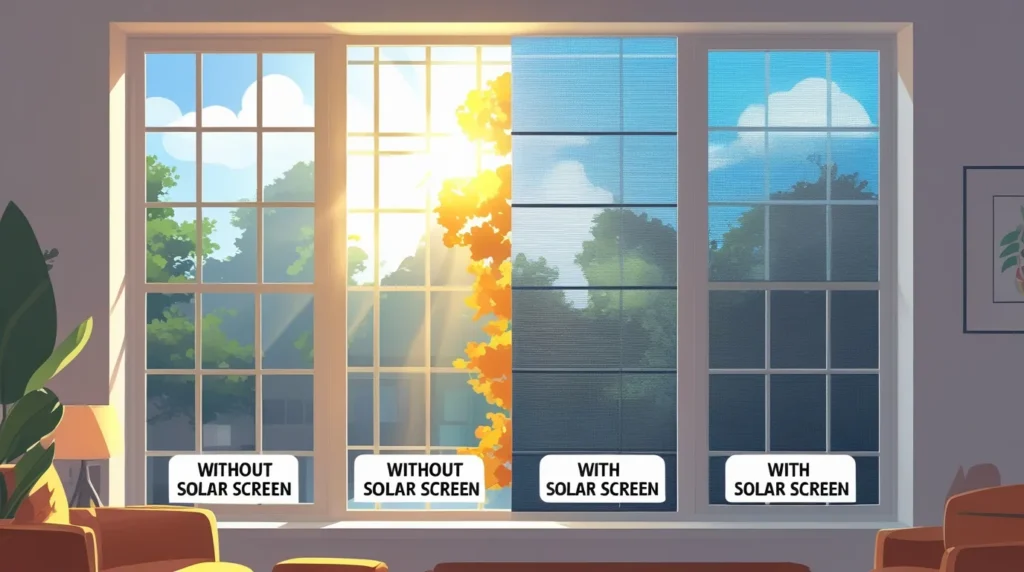
A solar screen looks like a regular window screen but is made from thicker fabric or mesh. This fabric is tightly woven to block sunlight while still allowing airflow. When sunlight hits a window, much of the heat is absorbed inside. With solar screens, much of that light and heat is reflected or absorbed before reaching the glass. So, how do solar screens work in daily use? They cut down on the amount of sunlight that passes through windows. This helps reduce indoor temperatures and creates a cooler, more comfortable space. Solar screens on windows are especially useful in rooms with large glass areas that face direct sunlight. They act like sun-blocking shades without making the room completely dark.
Do Solar Screens Really Work for Homes?
The simple answer is yes, solar screens do work. They are effective at reducing glare and blocking solar heat. Homeowners who install them often notice that their air conditioning runs less because rooms stay cooler. This can lead to energy savings over time. Does solar screen work in all situations? It depends on placement and material. A solar window screen installed on a south- or west-facing window will block more heat compared to a shaded or north-facing window. Results may vary, but in most homes, solar screens reduce heat gain by a noticeable amount.
Many people also like that solar screens provide some daytime privacy. From the outside, it’s harder to see in, while people inside can still look out comfortably.
Benefits of Solar Screens for Comfort and Energy Efficiency
There are many benefits of solar screens that go beyond just keeping a room cool:
- Heat reduction: Do solar screens block heat? Yes, they can reduce heat gain by up to 70–90% depending on the fabric type. This means less stress on cooling systems.
- Energy savings: Energy-efficient window screens help lower utility bills by reducing how often air conditioners run.
- UV protection: Solar screen fabric blocks harmful UV rays that can fade furniture, flooring, and artwork.
- Glare control: No more squinting or struggling to see the TV during the day.
- Privacy: Solar screens provide daytime privacy without needing heavy curtains.
For families who want more comfort without giving up natural light, solar screens are a smart solution.
Solar Screens on Windows: Function and Everyday Use
Solar screens on windows are easy to use and maintain. They can be installed on almost any type of window, including fixed, sliding, or double-hung styles. A window solar screen looks similar to a regular insect screen but is thicker and designed for sun control. House window solar screens are especially useful in bedrooms, living rooms, and sunrooms where glare is a problem. Home solar screens can also be used on porches or patios to create shaded outdoor spaces.
Outside solar screens are often installed on the exterior side of windows for maximum effectiveness. This placement blocks sunlight before it even reaches the glass. Some homeowners prefer removable solar screens that can be taken down during the winter months when more sunlight is welcome.
Comparing Solar Screens vs Window Film and Window Tint
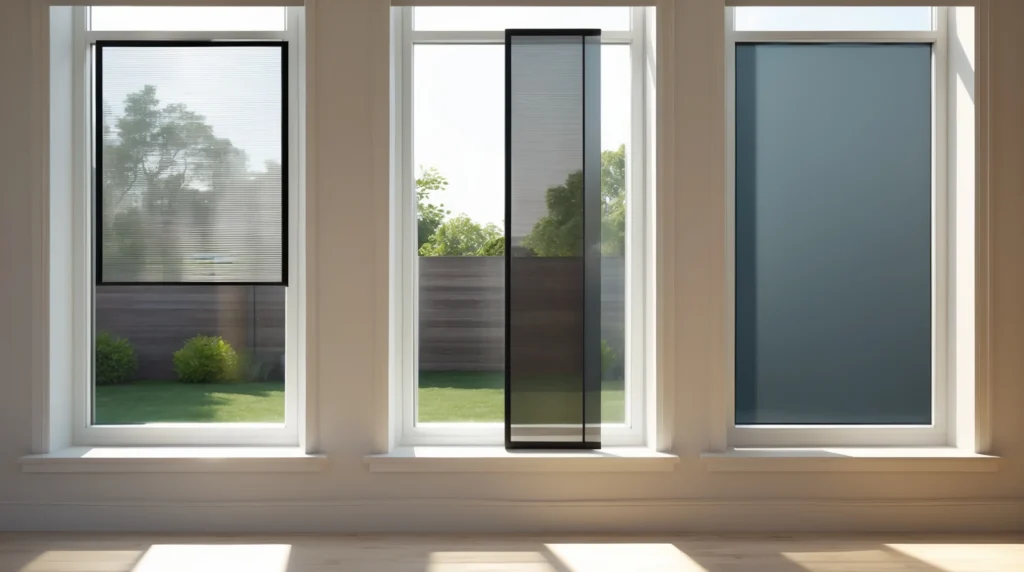
Many homeowners compare solar screens vs window film or solar screens vs window tint. Each option has advantages:
- Solar screens: Installed outside or on windows, they block sunlight before it enters. They are removable, allow airflow, and reduce heat.
- Window film: Applied directly to glass, it blocks heat and UV rays but cannot be removed easily. It can sometimes make windows darker year-round.
- Window tint: Similar to film, it reduces glare and adds privacy. However, window tint vs solar screens often comes down to cost and flexibility. Solar screens usually allow more control because they can be replaced or removed when not needed.
Solar shades vs solar screens is another comparison. Shades are installed inside and work more like blinds, while screens stop sunlight at the exterior. For most homes, screens provide more effective heat control.
Types of Solar Screens: Shades, Fabric, and Materials
Not all solar screens are the same. Different solar screen material types are available to match needs:
- Solar screen fabric: Woven material designed to block a percentage of sunlight. Common openness levels are 80% and 90%.
- Solar screen shades: These function like roller shades but use solar screen cloth to filter light indoors.
- Solar shade screen: A hybrid style that blends roller shades and solar screens.
- Sunscreen material: Basic mesh fabric designed for exterior use.
Choosing the right solar screen fabric depends on how much heat and glare you want to block. Darker screens block more glare, while lighter colors reflect more heat.
Cost Factors: How Much Do Solar Screens Cost?
One of the most common questions is: how much do solar screens cost? Prices vary based on size, fabric type, and installation method.
- Standard windows: Solar screens for windows cost anywhere from $40 to $120 each.
- Large windows or custom sizes: Solar window screens cost more depending on fabric rolls and labor.
- DIY solar screen: Homeowners can build their own screens using solar screen fabric rolls, which lowers cost but requires tools and time.
- Professional installation: Solar screen installation costs more but ensures proper fit and finish.
In general, the solar screen cost is less than window film for multiple windows and often pays for itself in energy savings within a few years.
DIY vs Professional Solar Screen Installation
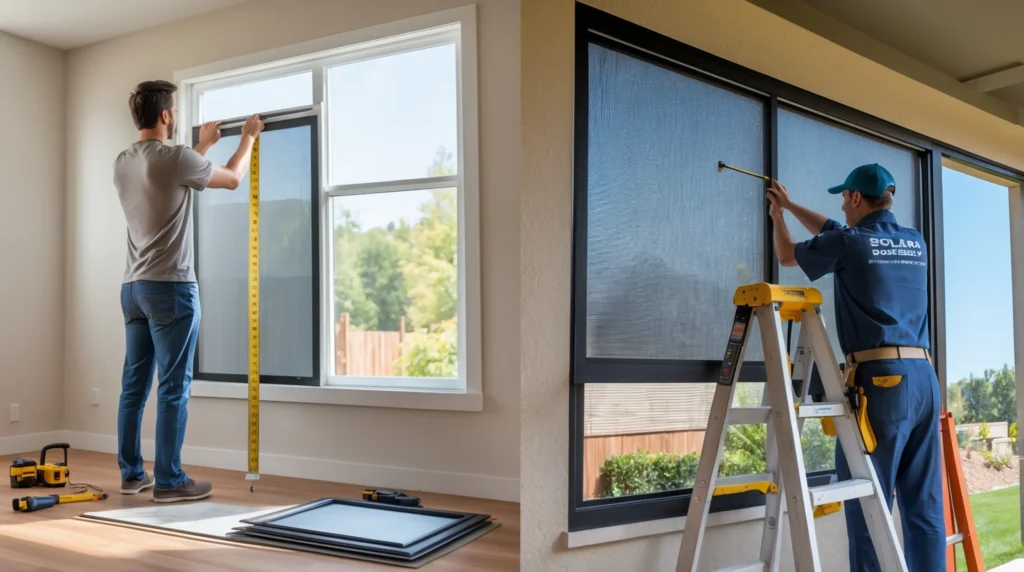
Some homeowners prefer diy solar screen projects to save money. This involves buying solar screen material and building frames to fit windows. DIY can be effective for small projects or handy homeowners. Professional solar screen installation, however, guarantees accurate measurement, tight fitting, and durable results. Installers also offer warranties and advice on the best solar screen shades for each room. For long-term value, many families choose professional service, especially for large or multiple windows.
Choosing Solar Screens in Wilmington, NC
Climate plays an important role when deciding on solar screens. In Wilmington, NC, summers bring high heat and humidity. The coastal sun can make homes uncomfortable without protection. Solar screens help block this heat before it enters, making homes cooler and energy bills lower. Homeowners in coastal areas often prefer exterior solar screens for windows since they provide the best defense against harsh sunlight. Seacoast Systems Inc. has seen how these products improve comfort and protect interiors from fading. Whether it’s for a city apartment or a beach house, solar screens are a smart choice for this region.
Are Solar Screens Worth It for Long-Term Investment?
Are solar screens worth it? For many homeowners, the answer is yes. They reduce heat, lower energy bills, and protect furniture. Heat-blocking window screens also improve comfort by cutting glare and providing privacy during the day. While they may not be needed on every window, using them on the sunniest sides of a house makes a big difference. Compared to window tint or film, solar screens are flexible and can be removed or replaced as needed. Seacoast Systems Inc. recommends solar screens as a long-term investment for families who want to balance comfort, energy efficiency, and style. They are not just about saving money but also about improving daily life at home.
If you’re ready to enjoy cooler rooms, lower energy bills, and added comfort, solar screens may be the right choice for your windows. Contact a trusted local expert today to learn more.

